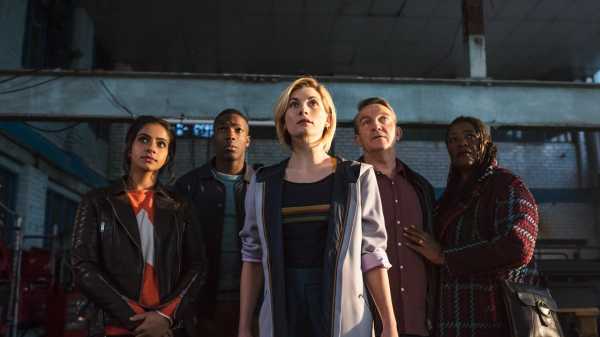
It’s 1963 and “Doctor Who” is on television: as the show’s title appears on the screen, a voiceless warble lofts over a throbbing bassline. For decades, the composer credit was given solely to Ron Grainer, but now we know that it is mostly the work of Delia Derbyshire, who manipulated tape at the BBC Radiophonic Workshop to create the eerie final product.
At first, the show’s background music was minimal. Exotic atmosphere was frequently supplied by a generic electronic hum, as lo-fi as the rubber-suit monsters and the cardboard spaceship consoles. In 1970, the show went from black-and-white to color, and the scoring became more luxuriant as well. Most of the composers used conventional instruments in addition to gadgets from the Radiophonic Workshop—a rare exception was Malcolm Clarke’s stunning all-electronic score for “The Sea Devils” episode.
The music of “Doctor Who” reached its first apex during the Tom Baker era (the actor who was the fourth Doctor), from 1974 to 1981. For the first six years of the Baker run, there was essentially a house composer, Dudley Simpson, who wrote near-continuous underscoring that was performed by varied chamber ensembles. Simpson really lets his hands go in “The Pyramid of Mars,” which includes the definitive “mad scientist at the pipe organ” cue. In popular polls attempting to determine the best “Doctor Who” story, the No. 1 slot usually goes to “City of Death,” a Parisian comedy that would be unthinkable without Simpson’s tuneful accompaniment.
For the last year of Baker’s tenure, the incoming producer John Nathan-Turner fired Simpson and other people who had made the show so successful. The Grainer/Derbyshire theme got its first significant facelift, transforming from something timeless into something resolutely 1980. Until the end of the first run of “Doctor Who,” in 1989, the show’s underscoring would be mostly done on contemporary synthesizers. Many of the scores were excellent—Paddy Kingland’s mournful backing of “Logopolis” is indelible—but something chintzy had crept into the show’s over-all production values. Eventually, the ratings sank and the show was cancelled. The Radiophonic Workshop also finally closed doors, in 1998, after a spectacular forty-year run.
In 2005, “Doctor Who” was rebooted with a new paradigm and quickly became an international sensation. The show was lifted by the producer Russell T. Davies’s decision to introduce emotionally complex plots that gave the Doctor’s companions their own story arcs. “Doctor Who” was no longer simply meant to entertain kids with a bunch of scary alien monsters and a chatterbox Time Lord. The show became yet another example of elevating a twentieth-century cartoon into something more substantial.
This new seriousness of purpose was supported by the sentimental orchestral music of Murray Gold. Gold re-orchestrated the Grainer/Derbyshire theme as a kind of pompous symphonic dance. His relentless underscoring showed a similar debt to John Williams. While many diehard “Doctor Who” fans from the last decade adore Gold’s work, I find it airless, charmless, and far too on the nose. To be fair, Gold is a professional who can write a good melody, and it was undoubtedly a group decision with Davies (and then with the next producer, Steven Moffat) to use music that tells the audience exactly what to feel, from desolate to heroic.
There’s a seemingly true cliché about “Doctor Who” fans: whomever was “your” Doctor when you were nine years old will always be “your” Doctor. (This also helps explain the longevity of the show: if you were born in 1954, William Hartnell was “your” Doctor. If you were born in 2009, Jodie Whittaker is “your” Doctor.) Back when I was a young fan of Tom Baker, Dudley Simpson offered far less hand-holding than Murray Gold. Whether the aliens were good or bad, whether the emotion was sad or glad, Simpson might supply something like a meandering trombone over a dissonant organ chord. My young mind had to reach in and make conclusions on my own, unguided by the underscore. Yep. Dudley Simpson almost certainly will always be “my” “Doctor Who” composer.
However, the current season is full of intriguing fresh beginnings. Most obviously, there’s the thirteenth iteration of the lead, played by Jodie Whittaker, who is the series’s first female Doctor. As the official tagline says, “It’s about time.” The producer, Chris Chibnall, is also new, and there’s a new composer, Segun Akinola.
Akinola has more or less restored the theme tune to the original Grainer/Derbyshire conception. Not much remains from Gold’s overstuffed orchestra in the bulk of the underscoring, either. There’s a bit of a heroic “Doctor’s Theme” for the heart-tugging moments, but we couldn’t expect the showrunners to get away from that entirely, could we? Those obvious themes seldom appear: the soundtrack is now usually aimless intervallic tunes, simple drones, and haunting effects. It’s a blessed return to an alien soundscape.
It’s not just the music. The show seems to be reinvestigating a darker, more measured past over all. The first episode, “The Woman Who Fell to Earth,” walks slowly and grimly around sleeping Sheffield while tracking a homicidal alien. It’s straight out of the seventies “Doctor Who” playbook. The second installment, “The Ghost Monument,” has the Doctor telling her companions to cheer up while wandering around an empty planet. At one point, this was essentially the plot of every other serial, but there hasn’t been an episode quite as bare-bones as this in a long time. Last week, “Rosa” dared to address the Rosa Parks story. I wouldn’t call it perfect, but I liked it better then previous historical episodes with Vincent van Gogh or Hitler.
Throughout, Akinola makes the right moves. He knows his stuff—in interviews he name-checks such modernist heavyweight composers as Iannis Xenakis and Georg Friedrich Haas—but, while working for “Doctor Who,” he gets out the show’s way and offers a mysterious and pleasing atmosphere. I haven’t been so excited to tune in since I was a kid.
Sourse: newyorker.com






